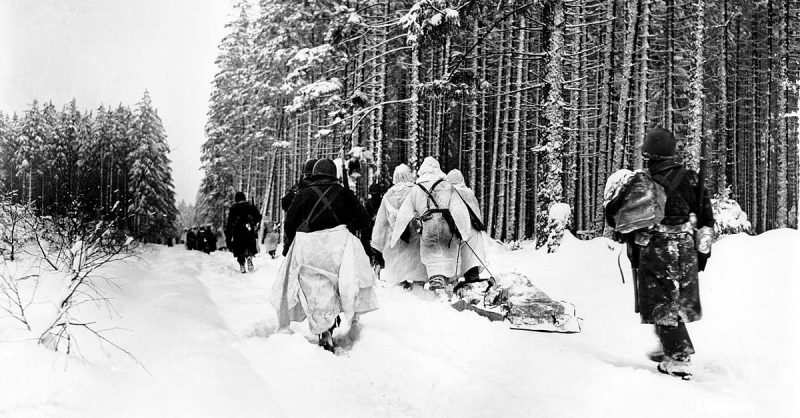Lou Martinez spent seven years in an orphanage in East Chicago. He remembers that the nuns there were strict in their discipline. “They had their ruler, and their ruler spoke to us.” His knuckles received many a blow from the nuns’ rulers. When he joined the Army, he learned that discipline was also strict there.
That discipline was important to the soldiers who were being sent off to fight the enemy in World War II. That is why they were willing to put themselves in harm’s way.
Martinez, now 92, remembers exactly why he enlisted.
He was working for US Steel, and it was freezing working outside, so he joined the Army and was sent to Camp Swift in Texas. He also spent some time in Louisiana as the Army prepared him for the war.
Martinez met a farmer in Louisiana who said he wouldn’t sleep out there for $10,000. He’d killed rattlesnakes in the area that were three to four feet long.
After spending time in Louisiana, Martinez was loaded on a ship with the other soldiers without knowing their destination. They sailed on a converted Italian cruise ship to Europe. He slept near the kitchen and still recalls smelling garlic the entire trip.
They landed at Normandy about two months after D-Day. There were still a lot of destroyed vehicles because no one had had time to clean them up yet.
He was sent to the Battle of Bulge, showing up with the reinforcements just when they were needed. The truck drivers had driven all night through a snowstorm to get there.
About 20,000 Allied soldiers were taken prisoners in the battle.
Martinez didn’t even know where he was. “All we did was fire our guns, our howitzers.”
The howitzers were large, capable of firing “small bombs” weighing 50 pounds each.
He experienced a few close calls including one time a shell landed three feet from him.
He doesn’t recall being cold, but he does remember living in foxholes. When they stopped to fight, they would dig foxholes, get some straw from a nearby farm to insulate the hole and take the doors off the farmhouse to put over the hole as a sort of lid.
When his unit reached the Rhine, they had to stop because the Germans had blown up all the bridges. They fired across the river until the Army engineers could build a pontoon bridge.
“Then it was just go, go, go, no resistance,” Martinez said. The German army was in disarray, and their soldiers didn’t know where to go.
Martinez took eighteen Germans prisoner by himself. They traded their medals and belt buckles for water. He put the loot in a bag with the German weapons. He lost the bag, so he didn’t get to keep the souvenirs.
He made Technician Fourth Grade before being sent home from the war. He tried to pursue a baseball career, but that didn’t work out for him. He taught Little League and taught his son to play baseball as soon as he could hold a ball, nwitimes.com reported.
He went back to school for television repair, but couldn’t keep up with the necessary math, so he went to auto body repair school. He worked repairing auto body frames until he retired.
He never forgot the lessons he learned in the war.
When they dedicated the World War II memorial, his daughter took him to the ceremony. He said it was an honor for him and for the other veterans that attended that day.
“Man, those people were approaching me like I was General Ike,” he said, referring to Dwight David “Ike” Eisenhower, US General and 34th President of the United States.
